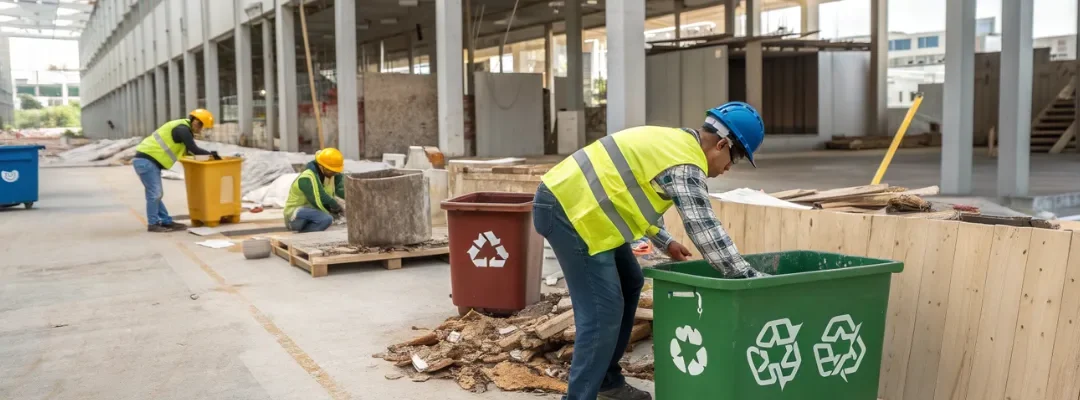Construction is one of the largest contributors to global waste. From concrete debris and steel scraps to packaging and excavated soil, the industry generates millions of tons of waste annually. Poor disposal not only harms the environment but also increases project costs and delays.
This is why waste management in construction is more important than ever. Effective waste handling saves money, improves sustainability, and ensures regulatory compliance.
What Is Construction Waste Management?
Construction waste management involves the systematic collection, separation, recycling, and disposal of waste materials generated during construction, renovation, or demolition projects.
It’s not just about disposal—it’s about reducing, reusing, and recycling to minimize waste and maximize value.
Types of Construction Waste
- Concrete, Bricks, and Masonry – Demolition debris
- Wood and Timber – Shuttering, scaffolding, offcuts
- Metals (Steel, Aluminum, Copper) – Reinforcement, piping, roofing
- Glass and Plastics – Windows, packaging
- Soil and Excavated Earth – From digging foundations
- Hazardous Waste – Paints, solvents, adhesives, asbestos
Why Waste Management Is Important in Construction
1. Environmental Protection
- Reduces landfill pollution
- Prevents contamination of soil and water
- Promotes recycling and circular economy
2. Cost Savings
- Recycling materials reduces purchasing costs
- Less waste disposal = lower tipping fees
- Efficient material use prevents wastage
3. Legal Compliance
- Meets local and international waste regulations
- Avoids fines, penalties, and project delays
- Supports green certifications like LEED & BREEAM
4. Improved Project Efficiency
- Organized sites are safer and more productive
- Less clutter reduces accidents and delays
- Waste segregation improves material recovery
5. Corporate Reputation
- Enhances brand image as an eco-conscious builder
- Attracts clients looking for sustainable construction practices
- Improves chances of winning government contracts
Strategies for Effective Waste Management
Plan early – Incorporate waste reduction in design phase
Segregate on-site – Separate metals, plastics, wood, and concrete
Reuse materials – Use crushed concrete as road base, reclaimed wood for formwork
Partner with recyclers – Collaborate with certified waste recycling facilities
Train workforce – Educate workers on proper disposal and segregation
Monitor and audit – Track waste quantities to improve performance
Benefits of Sustainable Waste Practices
| Benefit | Impact |
|---|---|
| Reduced disposal costs | Saves money for contractors |
| Eco-friendly construction | Lower carbon footprint |
| Resource efficiency | Conserves natural raw materials |
| Safety improvement | Reduces site accidents and hazards |
| Competitive advantage | Attracts eco-conscious clients |
FAQs
Q: What percentage of construction waste can be recycled?
A: Up to 75–90% of construction waste (concrete, metals, wood, glass) can be recycled if managed properly.
Q: Is waste management expensive for small projects?
A: Not necessarily—small projects can cut costs by reusing materials and avoiding landfill disposal fees.
Q: Does waste management contribute to green building certification?
A: Yes. Effective waste practices help earn LEED, IGBC, and BREEAM credits.

